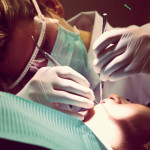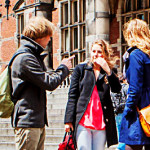News of the week 50
Arts faculty financing ‘worrying’
 The faculty has fallen deep into the red again and if no action is taken, they will end 2019 with an operating deficit of 7.8 million euros. Students and staff feel that the faculty is a victim of the RUG distribution model of government funding among all faculties.
The faculty has fallen deep into the red again and if no action is taken, they will end 2019 with an operating deficit of 7.8 million euros. Students and staff feel that the faculty is a victim of the RUG distribution model of government funding among all faculties.
The faculty has to satisfy the demand for education and its costs, but many students enroll less than full time and the faculty has to pay the difference. Although student numbers have increased, a noticeable increase in income has yet to follow. The faculty board feels the faculty should receive more money.
Study associations question Next
The RUG wants to give Next a bigger role in preparing students for a professional career, which students have called for in the National Student Survey for years. But a survey from Lijst Calimero found that the majority of student associations do not see the usefulness of Next.
Calimero feels that working with Next should not be imposed on study associations who have been organizing career events with businesses for years. In the University Board’s new plan, they will take into account the plans and activities of study associations and increase the number of staff at Next to create better collaboration.
No fees for student board members
 Education minister Jet Bussemaker has promised to ensure that students who serve as board members for a year do not have to pay tuition fees. Student party SOG is in favour, as they have been pleading for such a structure for years.
Education minister Jet Bussemaker has promised to ensure that students who serve as board members for a year do not have to pay tuition fees. Student party SOG is in favour, as they have been pleading for such a structure for years.
A board year can be important for personal development and have a positive effect on one’s career, according to RUG alumni research. Many students don’t do a board year as they cannot receive a student loan and a bursary cannot cover all costs. It is not clear whether the arrangement will apply to everyone or only students with little financial support.
More students living at home
Since 2012, the percentage of students living away from home is now 64.5, which is down by seven per cent. Among RUG students, that has also declined from 80 per cent to 73.7. At the Hanze University of Applied Sciences, slightly more than 38 per cent of students still live at home.
The reason for these figures is most likely the end of the basic grant and implementation of the new loans system, which doesn’t make a distinction between those living at home or away when determining the amount which can be lent.
Academic and Internet freedom in China
 In a Memorandum of Understanding to be discussed by the University Council this Thursday, three issues – guaranteeing academic freedom and uncensored access to information; quality control of programmes according to Dutch standards, the accreditation organisation NVAO and the ministry of education; and administrative organisation of the Yantai campus – are covered.
In a Memorandum of Understanding to be discussed by the University Council this Thursday, three issues – guaranteeing academic freedom and uncensored access to information; quality control of programmes according to Dutch standards, the accreditation organisation NVAO and the ministry of education; and administrative organisation of the Yantai campus – are covered.
The document is an extension of an agreement signed in March. RUG president Sibrand Poppema says that the University would consider backing out if academic freedom is not ensured.
Dentistry becoming learning community
 Dentistry is meant to become a learning community starting 2017. The framework focuses on students working in small groups and forming a community, as well as studying the lesson material at home and doing group assignments during the lesson.
Dentistry is meant to become a learning community starting 2017. The framework focuses on students working in small groups and forming a community, as well as studying the lesson material at home and doing group assignments during the lesson.
The programme will hopefully be improved by better distribution of learning material and a more balanced structure. With the new framework, the faculty aims to finally tackle the persistent culture of fear, and teachers will be trained to use new methods.
‘Universities don’t abuse matching’
 The editors of the University Catalogue proclaimed recently that universities used the study choice check as a short cut to reject less promising students. However, minister Bussemaker says that they did not do their research and based their claims on two incidental reports.
The editors of the University Catalogue proclaimed recently that universities used the study choice check as a short cut to reject less promising students. However, minister Bussemaker says that they did not do their research and based their claims on two incidental reports.
One report has already been address and the other is pending further inspection. Beyond that, Bussemaker has received no reports of the study choice check being misused. University association VSNU and student parties ISO and LSVb see the miscommunication as hazardous and LSVb plans to investigate next year.
Scoring poorly on subsidies
 Only one of the 291 European ERC starting grants, which are worth 1.5 million euros in total and are intended for promising researchers, went to the RUG this round. Chemist Katalin Barta received a grant for her research on ‘green catalysis’. With the grant, she will develop a process to convert biomass into usable chemical substances in a sustainable way without harmful waste.
Only one of the 291 European ERC starting grants, which are worth 1.5 million euros in total and are intended for promising researchers, went to the RUG this round. Chemist Katalin Barta received a grant for her research on ‘green catalysis’. With the grant, she will develop a process to convert biomass into usable chemical substances in a sustainable way without harmful waste.
Last year, the RUG received three grants and two the year before. Dean of Talent Development Ritsert Jansen puts the outcome down to other reasons. Jansen thinks that faculties should assess which researchers will be taken into consideration earlier and focus on them.







